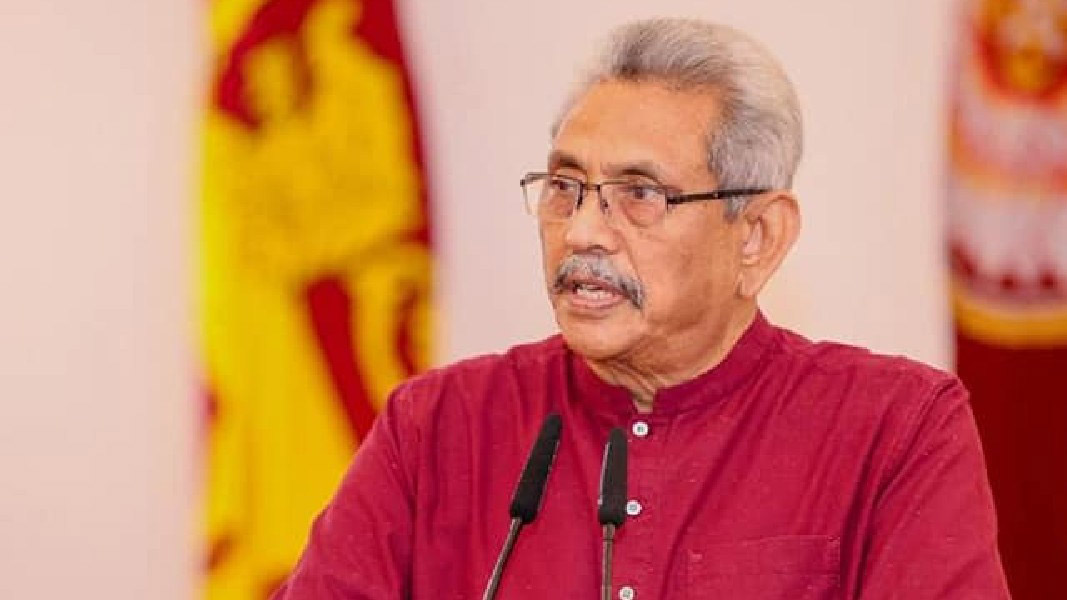Sri Lanka’s President Gotabaya Rajapaksa finally resigned from his position on Friday, July 15.
Speaker's official announcement on the resignation of the H.E. President Gotabaya Rajapaksa!https://t.co/asq8kl9gHg
— Parliament of Sri Lanka (@ParliamentLK) July 15, 2022
අතිගරු ජනාධිපති ගෝඨාභය රාජපක්ෂ මහතාගේ ඉල්ලා අස්වීමේ ලිපිය තමා වෙත ලැබුණු බව කථානායක ගරු මහින්ද යාපා අබේවර්ධන මහතා මීට සුළු වේලාවකට පෙර නිවේදනය කළේය.ඒ අනුව 2022 ජූලි 14 වන දින සිට ජනාධිපතිවරයා සිය ධුරයෙන් නීත්යනුකූලව ඉල්ලා අස්වී ඇති බවත් කථානායකවරයා නිවේදනය කළේය!
1/3 pic.twitter.com/xw1j4VcfDP— Parliament of Sri Lanka (@ParliamentLK) July 15, 2022
On July 15, Speaker of Parliament Mahinda Yapa Abeywardena announced his acceptance of Rajapaksa’s letter of resignation, which was sent via email from Singapore the previous night. Abeywardena also announced that parliament will convene on July 16 to inform the members of the House about the presidential vacancy. The new President would be elected through Parliament from one of its members on July 20, as decided by party leaders at an earlier meeting held on July 11.
Gotabaya Rajapaksa, who came into power in 2019 as the country’s seventh executive president, fled to Maldives early this week after thousands of protesters stormed his official residence on July 9. He is currently in Singapore and is reportedly scheduled to fly to Saudi Arabia, but neither his final destination nor whether or not he will be granted asylum is known.
Sri Lankan president Gotabaya Rajapaksa submitted a letter of resignation, a spokesperson for the parliament speaker said, hours after fleeing to Singapore following mass protests over an economic meltdown https://t.co/QTJNFPXXZG pic.twitter.com/FU9UBK6r33
— Reuters (@Reuters) July 15, 2022
Soon after Rajapaksa’s resignation, Prime Minister Ranil Wickremesinghe was sworn in as the Acting President before Chief Justice Jayantha Jayasuriya. Wickremesinghe currently holds the position of both President and Prime Minister of Sri Lanka. He is also attempting to be the president and is supported by section of Rajapaksa’s SLPP party.
Wickremesinghe will be performing all presidential duties until July 20, when a new president is elected. He has reportedly banned the use of his presidential title “his excellency”, and presidential flags.
Ranil Wickramasinghe making a statement says his first two decisions as acting president is to ban using His excellency to President and abolishing presidents flag
— Ranga Sirilal (@rangaba) July 15, 2022
Rajapaksa, who fled the country on Wednesday July 13, emailed his resignation letter via the Sri Lanka High Commission in Singapore to Speaker Abeywardena on the night of July 14. After a failed attempt to exit the country from the Bandaranaike Airport, Rajapaksa and his wife fled the island on an Air force military plane to neighboring Maldives and later to Singapore “for fear of his life,” according to Mohamed Nasheed, Maldivian Speaker and the ex-President of Maldives.
🇱🇰 President GR has resigned. I hope Sri Lanka can now move forward. I believe the President would not have resigned if he were still in Sri Lanka, and fearful of losing his life. I commend the thoughtful actions of the Govt of Maldives. My best wishes to the people of Sri Lanka.
— Mohamed Nasheed (@MohamedNasheed) July 14, 2022
Massive protests rocked Sri Lanka on Saturday, July 9, leading to a governmental collapse. Sri Lanka has been going through an economic crisis for months, characterized by a foreign exchange shortage and a subsequent scarcity of essentials such as food, fuel and medicine.
In the latest update, the media division of the Sri Lankan army has announced that the members of the Armed Forces and the Police have been empowered to enforce law and order in the country “in order to protect people, public property and lives.”
After the events of July 13, when crowds protesting Rajapaksa’s run stormed the Prime Minister’s office, Wickremesinghe announced a curfew and imposed a state of emergency on the entire island, even before he was officially sworn in as Acting President. Wickremesinghe lambasted protesting citizens as “fascists”.
On July 14, a day after storming the PM’s Office, leaders of the Argalaya (the struggle) movement have announced that those protesting the Rajapaksa regime and its sympathizers have decided to return control of some of the government buildings that they had been occupying for several days.





